Being the MANAGER can often be a thankless job. You’re always under pressure to get good results, and your job security is virtually nonexistent. If you’re at a big club, then you had better produce some silverware otherwise, you’ll have to update that résumé. The old adage about how it’s a whole lot easier to fire one manager than to replace 11 players pretty much sums up the difficulties of being a top-flight manager. Either you win, or you find another job. It’s a ruthless profession that’s chewed up and spat out many, many people.
As such, it’s hard enough to become a good manager. It’s even more difficult to become a legendary manager. Not only do you have to win consistently, but you have to have some special qualities that separate you from the pack (and no, simply calling yourself ‘Special’ doesn’t qualify – I’m looking at you, José). Some of the great gaffers in the game were tactical geniuses. Some were great at getting the most out of their players. Some were astute judges of talent. The following managers excelled in all of those aforementioned areas, including several others. That makes them legendary.
In chronological order…
.
.
.
Vittorio Pozzo |
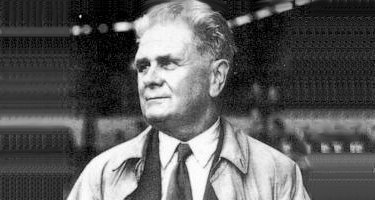 |
|
| ITALY | ||
| 1912-1948 | ||
| Italy (1912, 1928, 1929-1948) Torino (1912-1922) A.C. Milan (1924-1926) |
||
.
“Il Vecchio Maestro” (The Old Master) was an innovator and a tactian who presided over a dominant stretch by the Italian national team. Italy went unbeaten from December 1934 until 1939, and he won the 1934 and 1938 World Cups. He won nearly 66% of his matches with the National Team, a record for Italy.
Pozzo was a strict disciplinary who wasn’t afraid to get tough with his players if necessary. Pozzo dropped his team’s skipper on two separate occasions, particularly in 1934 when he cut full-back Umberto Caligaris a couple of months before the World Cup.
He was also a great tactician, inventing the Metodo formation, which was a variation of the widely used 2-3-5 formation. He pulled two of his forwards and moved them into withdrawn positions, giving his sides more defensive cover. The results were obvious as he won two World Cups with this formation.
Pozzo’s political views came under fire due to his perceived support from the Mussolini regime, the way he gave the Fascist salute before matches, and his decision to have his players wear all-black during the 1938 World Cup Quarterfinals against France (Mussolini’s National Security Volunteer Militia, which was kind of like his version of the SS, wore black uniforms and were referred to as “The Blackshirts”) . Considering the fact that Mussolini wasn’t exactly known for his leniency with political opponents, Pozzo’s actions were probably necessary to ensure his continued livelihood.
Regardless of his political stances, Pozzo was a great manager who was every bit as innovative as he was successful.
.
.
.
Matt Busby |
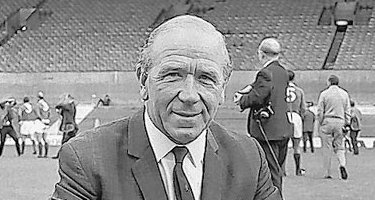 |
|
| ENGLAND | ||
| 1945-1971 | ||
| Manchester United (1945—1969, 1970-1971) Great Britain (1948) Scotland (1958) |
||
.
Imagine losing many of your best players in a horrific plane crash, including a number of precocious talents that you developed and nurtured since they were lads. Many managers wouldn’t have been able to recover from that disastrous twist of fate. However, not only did Sir Matthew Busby recover after the Munich Air Disaster robbed him of many of his best players, he was able to hold his shaken team together and rebuild it, thereby setting the stage for United’s resurgence in the late 60’s.
Busby had immediate success upon his arrival at United, winning the F.A. Cup in 1947-1948 and then winning the First Division crown in 1951-1952. Busby set about replacing his aging veterans with young talents, such as Bobby Charlton, Duncan Edwards, Bobby Foulkes, Mark Jones, Jackie Branchflower, Billy Whelan, and Albert Scanlon. The “Busby Babes” as they were known, seemed poised to rule football for the next decade until the Munich Air Disaster.
Busby, who suffered severe injuries in the crash, persevered and rebuilt his team. In the next few years, he signed George Best, Denis Law, Albert Quixall, and David Herd to go with survivors Charlton and Foulkes, and United soon returned to glory. They won the 1963 F.A. Cup, they won League Titles in 1965 and 1967, and, most notably, they won the 1968 European Cup, defeating Benfica and their great forward, Eusebio, in the Final by a score of 4-1.
For most managers, winning the European Cup would have represented the pinnacle of their careers. For Busby, it was a sweet achievement, but ranked a distant third behind surviving the plane crash and rebuilding his team.
.
.
.
Bill Shankly |
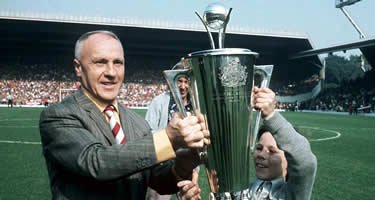 |
|
| ENGLAND | ||
| 1949-1974 | ||
| Carlisle United (1949—1951) Grimsby Town (1951—1954) Workington (1954—1955) Huddersfield Town (1956—1959) Liverpool (1959—1974) |
||
.
Shankly was known as a master motivator who got the most out of his players. He used psychological tactics, such as praising his players in front of the cameras, in order to puff up their egos and win their affection. When he was at Huddersfield Town, he vowed that 16-year old Denis Law would one day be transferred for what was then an unheard of fee of £100,000. Law was eventually signed by Manchester United for £115,000. At Liverpool, Shankly used to refer to his captain, Ron Yeats as a seven-foot colossus of a man, even though he only stood 6’3”. It may have been corny, but Yeats sure felt good about it.
Shankly also introduced some training techniques that were revolutionary at the time, such as holding five-a-side matches to promote passing and fluid movement and dividing the goal into eight sections and forcing players to hit each section in an effort to increase accuracy. He also promoted team chemistry by busing his players from Anfield to their practice facility at Melwood, and made sure that players warmed down properly so as to decrease the risk of injury.
Shankly also had a keen eye for talent and built his 60’s squad around the likes of Ron Yeats, Ian St. John and Gordon Milne, and Peter Thompson. In the 70’s, he brought in Kevin Keegan, Steve Heighway, Larry Lloyd and Ray Clemence and laid the groundwork for the dominant teams of the late 70’s and early 80’s that flourished under his successor and protégé, Bob Paisley.
Shankly won 537 games during his career, including 393 at Liverpool. He won three First Division Titles, 2 FA Cups, and one UEFA Cup. He abruptly retired in 1974 at the relatively young age of 60 (although some claim he was forced out by the board), otherwise, he probably would have added even more silverware to his cupboard. He was deeply hurt at leaving his beloved club, indeed, his love of Liverpool was such that he once said that the two best teams in Merseyside were Liverpool and Liverpool’s reserves. Additionally, he didn’t quite know what to do with his time, which was understandable for a man whose famous quote was “Someone said ‘football is more important than life and death to you’ and I said ‘Listen, it’s more important than that’.” He continued showing up at training sessions, even after Paisley took over, and his presence was enough to undermine his successor’s authority. As such, they had to ask him not to come back.
Nevertheless, Shankly firmly established himself as one of the greatest managers of all time, and was an inaugural inductee into the English Football Hall of Fame in 2002.
.
.
.
Jock Stein |
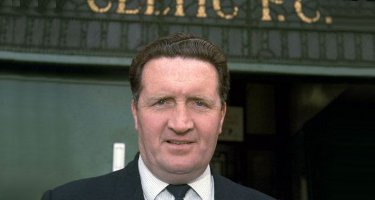 |
|
| SCOTLAND |  |
|
| 1960-1985 | ||
| Dunfermline Athletic (1960-1964) Hibernian (1964-1965) Celtic (1965-1978) Scotland (1965) Leeds United 1978) Scotland (1978-1985) |
||
.
Stein presided over the greatest period in Celtic history, winning the Treble in 1967. In all, he won 10 Scottish League titles, 8 Scottish Cups, and 6 League Cups. Under Stein, Celtic became the first and only Scottish team to win the European Cup, and were the first British team to accomplish this feat. Most notably, he won the European Cup by fielding an entire team of players born within 30 miles of Glasgow. After winning the European Cup, Bill Shankly told Stein: “You’re immortal now.”
During his run at Celtic, he fielded an entertaining team that played a 4-2-4 formation. Stein’s “Lisbon Lions” produced a number of Celtic legends, like Billy McNeill, Bobby Murdoch, Bertie Auld, Jimmy Johnstone, and Bobby Lennox. He was badly injured in a car accident and missed most of the 1975-1976 season. He returned to Celtic, but was let go after the team went into decline.
He continued to manage, but never reached the same heights that he did at Celtic. He managed Scotland from 1978-1985, during which time he led Scotland to the 1982 World Cup. During the run-up to the 1986 World Cup, he secured a draw with Wales which set up a playoff against Australia with the winner qualifying for the World Cup. He suffered a heart attack right after Wales match and died. Scotland went on to qualify for the World Cup, but were eliminated in the group stage. During his time with Scotland, he also mentored a young Alex Ferguson, who became a pretty good manager in his own right.
.
.
.
Ernst Happel |
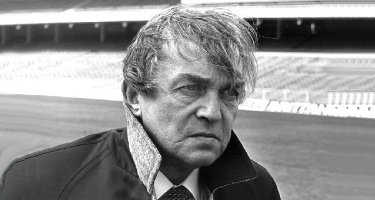 |
|
| AUSTRIA |  |
|
| 1962-1992 | ||
| ADO Den Haag (1962-1968) Feyenoord (1968-1973) Sevilla (1973-1975) Club Brugge (1975-1978) Netherlands (1978) Standard Liège (1979-1981) Hamburger SV (1981-1987) FC Tirol (1987-1991) Austria (1991-1992) |
||
.
He was a quiet and unassuming man. Instead of being bombastic and outspoken, he let his teams do the talking for him. And boy did they talk.
Happel won league titles in the Netherlands, Belgium, Germany and Austria. He became one of only two managers to win the European Cup/Champions League with two different clubs. He turned the trick with Feyenoord and Hamburger SV, two traditionally mediocre European teams that had never won the big prize before, and haven’t won it since.
He coached the Netherlands to the Finals of the 1978 World Cup where they lost to Argentina. His pre-match pep talk was said to consist of the following sentence: “Gentlemen, two points.”
Due to his understated demeanor, it’s somewhat ironic that the largest and grandest stadium in Vienna was named after him. Then again, the stadium’s importance to Austria is symbolic of Happel’s value to his home country.
.
.
.
Rinus Michels |
 |
|
| NETHERLANDS |  |
|
| 1965-1992 | ||
| Ajax (1965—1971 1975-1976) Barcelona (1971—1975) Netherlands (1974, 1984-1985, 1986-1988, 1990-1992) Los Angeles Aztecs (1979—1980) FC Köln (1980—1984) Bayer Leverkusen (1988—1989) |
||
.
One of the most influential managers in football history, Michels can lay claim to being the greatest of all time. He was named FIFA’s “Coach of the Century” in 1999, and he is credited for creating the “Total Football” technique employed by his Netherlands teams in the 1970’s.
During his time at Ajax, he won four Eredivisie titles in six seasons and also won three KNVB Cups. He also managed Ajax to the first of their three consecutive European Cups as he demonstrated the power of his “Total Football” philosophy. He utilized Johann Cruijff as an all-around attacker who could play anywhere on the pitch. He also won with Barcelona, winning one La Liga title and one Copa del Rey title.
He brought his revolutionary tactics to the Dutch national team, turning “Clockwork Orange” into a powerhouse. His best team was in 1974, when he took a heavily favored Dutch team into the World Cup. They romped through their group stage matches and met West Germany in the Final. Using an excellent man-marking scheme that neutralized Cruijff, West Germany pulled off the upset, winning 2-1. Michels came back to the Dutch national team in 1986 and guided the club to a victory in the European Championships.
Off the pitch, Michels had an easygoing personality and was known as something of a practical joker. On the pitch, though, he was no-nonsense, and once compared football to being at war. He was even nicknamed “The General” for his demeanor on the pitch. It was an appropriate nickname for someone who was as innovative and as devoted to football as he was.
.
.
.
Brian Clough |
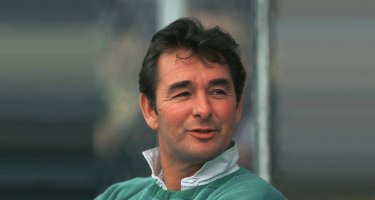 |
|
| ENGLAND | ||
| 1965-1993 | ||
| Hartlepool United (1965—1967) Derby County (1967—1973) Brighton & Hove Albion (1973—1974) Leeds United (1974) Nottingham Forest (1975—1993) |
||
.
Clough was arrogant, abrasive, and outspoken. Like Jose Mourinho, he had unshakeable confidence in himself and believed that he was the best in the world. It’s hard to dispute that, given his resume.
Clough rose to prominence at Derby County, taking them out of League Two (where they were won the Championship), and rising all the way to the League One Title in 1971-1972. He had embarked on an ambitious rebuilding program upon his arrival at Derby, letting go of 11 players, numerous club officials, and even two tea ladies who had the audacity to laugh after a Derby County defeat. The following season, Derby were knocked out of the Semi-Finals of the European Cup by Juventus amid allegations that the referee had received gifts from the Turin side before the match (some things never change). The outspoken Clough attracted controversy by calling the Juventus players “cheating bastards.” It would not be the only time his mouth got him in hot water.
At Leeds, he became infamous for his 44-day stint in charge, during which time he alienated several important players and winning only one out of the first six matches. Upon his departure, he said “This is a terrible day… for Leeds United.”
Clough bounced back, though, and went to Nottingham Forest, where he won two European Cups and went 42 league matches without a defeat (a mark bettered only by Arsenal’s 49 match streak from 2003-2004). Interestingly, Nottingham Forest only won one English League Title during Clough’s reign, making them one of the few teams to have won more European titles than domestic titles. He did add two League Cups to his cupboard, and nearly pulled off a domestic treble in 1989, winning the League Cup, finishing third in the League, and making it to the Semi-Finals of the F.A. Cup.
Clough never achieved his dream of managing the English National Team. When asked why, he replied: “I’m sure the England selectors thought if they took me on and gave me the job, I’d want to run the show. They were shrewd because that’s exactly what I would have done.” Controversial to the very end…
.
.
.
Bob Paisley |
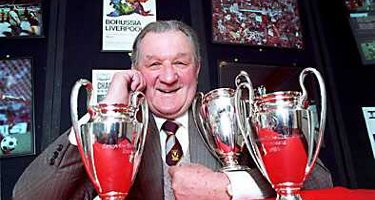 |
|
| ENGLAND | ||
| 1974-1983 | ||
| Liverpool | ||
.
A true Liverpool legend who spent more than 50 years with the club as a player and manager, Paisley’s greatest accomplishment may have been stepping out of legendary predecessor Bill Shankly’s large shadow and establishing his own legend. Paisley was so successful and won so much silverware that it seems hard to believe that he only spent nine years as manager.
Nevertheless, he won at least one trophy in eight out of his nine years, he finished either first or second in the Football League in all but one of his years in charge, and he won multiple trophies in five of his nine seasons. He remains the only manager to win three European Cups as a manager.
Paisley was a low-key manager who tended to keep a low profile. He had a sardonic wit, as evidenced by his statement that he knew what it was like to face adversity. “We finished second once,” he said. After winning the 1977 European Cup Final against Borussia Moenchengladbach in Rome, he quipped that this was the second time he was victorious against the Germans in Rome. “The first time was in 1944. I drove into Rome on a tank when the city was liberated.”
While he undoubtedly benefitted from Shankly’s players, Paisley signed his share of great players that contributed to Liverpool’s success. Kenny Danglish, Ian Rush, Bruce Grobelaar, Graeme Souness, and Alan Hansen were all players who went on to become Liverpool legends under Paisley.
Unfortunately, Paisley was diagnosed with Alzheimer’s Disease in 1992 and he died in 1996. In 2002, he was an inaugural inductee in the English Football Hall of Fame, gaining football immortality alongside his mentor, Shankly.
.
.
.
Sir Alex Ferguson |
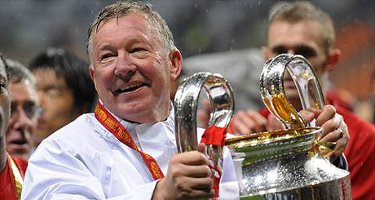 |
|
| SCOTLAND |  |
|
| 1974-present | ||
| East Stirlingshire (1974) St. Mirren (1974-1978) Aberdeen (1978-1986) Scotland (1985-1986) Manchester United (1986—present) |
||
.
When Sir Alex Ferguson took the reins of Manchester United, they were a storied franchise that had fallen on some hard times. Ferguson had experienced a lot of success at Aberdeen, winning three Scottish League Titles and lifting the Cup Winners’ Cup in the 1982-1983 season. However, his first few years at Old Trafford were a disappointment as Ferguson failed to win any silverware despite bringing in the likes of Paul Ince, Mark Hughes, Steve Bruce, and Gary Pallister. United fans were calling for his head once the club was humiliated by Manchester City, 5-1.
The board stuck with Ferguson, and he rewarded their faith in him in spades. He won the FA Cup in 1990, which was his first trophy with United. He’s won a few more in the intervening years. As of the 2008-2009 season, he’s won 10 Premiership titles, 5 F.A. Cups, 2 League Cups, and 2 Champions League crowns. They won the Treble in 1998-1999 and they’ve never finished lower than third in the Premiership.
Sir Alex Ferguson has always done a good job at developing talent, and his “Fergie’s Fledglings” class of David Beckham, Paul Scholes, Nicky Butt, and Gary and Phil Neville played a huge role in establishing the club’s run of dominance in the mid-to-late 90’s. He also developed Ryan Giggs, who broke into the squad before the Fledglings and continues to make a contribution to this day. He has always been willing to spend big, however he only buys players who will fit into his system, rather than spend for the sake of spending. He broke the British transfer record for Roy Keane because he needed a replacement for Bryan Robson. He signed Rio Ferdinand, the most expensive defender of all time, to fill the void left by Jaap Stam. He saw qualities in Dimitar Berbatov that reminded him of the great United legend Eric Cantona, so he broke the club transfer record once again.
Most impressively, Sir Alex Ferguson has been able to carve out his own legend, despite performing in the shadow of Sir Matthew Busby. Whoever follows him at Old Trafford will have some huge shoes to fill.
.
.
.
Arsène Wenger |
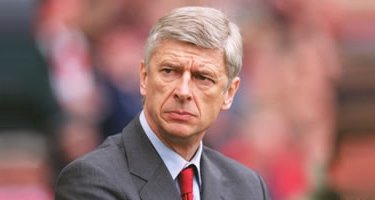 |
|
| FRANCE |  |
|
| 1984-present | ||
| AS Nancy-Lorraine (1984-1987) AS Monaco (1987-1994) Nagoya Grampus Eight (1995-1996) Arsenal (1996-present) |
||
.
Arsène Wenger may not have won a European Cup/UEFA Champions League crown, but he is, without question, one of the best judges of talent in the history of the game. His keen eye for talent (vision that, unfortunately, fails him whenever one of his players is sent off) has allowed him to win everywhere he’s been while spending a fraction of what his rivals dish out.
His career took off when he went to AS Monaco, where he won the league in his first season in charge while adding great players such as Juergen Klinsmann, Glenn Hoddle, Youri Djorkaeff, and George Weah. He spent a year in Japan where he added the Emperor’s Cup to his collection. He then went to Arsenal, where he’s been ever since.
At Arsenal, he’s been able to consistently field talented, entertaining teams while filling his trophy cabinet with silverware. He’s won three Premiership titles and four FA Cups. Additionally, Arsenal have never finished lower than fourth in the league under Wenger. He went unbeaten during the 2003-2004 Premiership season, and extended that run into the following season before finishing with a record 49-match unbeaten streak.
He also unearthed talented players who went on to become world-beaters at Arsenal. Thierry Henry was a mediocre winger until he came to Arsenal, where he became one of the greatest strikers ever to play in England. Patrick Vieira was an unused reserve with AC Milan until Wenger made him into the midfield enforcer and playmaker who provided the backbone for many of Wenger’s great Arsenal teams. Cesc Fabregas, Robin Van Persie, Robert Pirès, Freddie Ljungberg, Kolo Touré, Sylvain Wiltord, and Nicholas Anelka, were but a few examples of low-cost players who achieved great success under Wenger.
In a world where money talks and everything else walks, it’s refreshing to see someone who refuses to simply spend his way to a title.
.
.
.
Text & Career Summaries by Victor Li. Formatting and Image Research by Marco Pantanella.
Back to Football Legends homepage.
Add Sportslens to your Google News Feed!